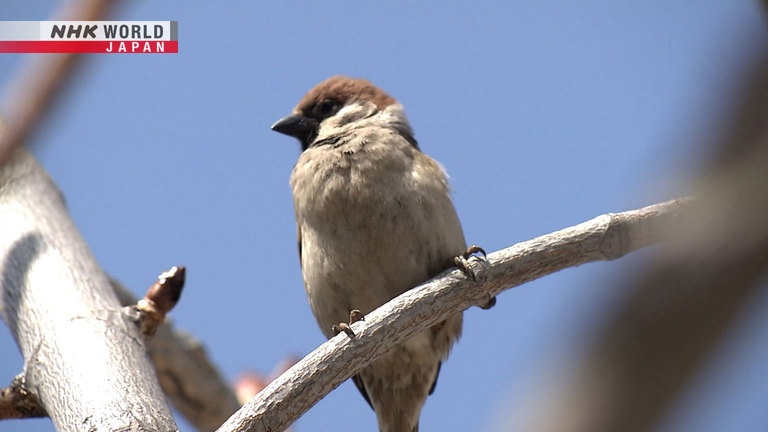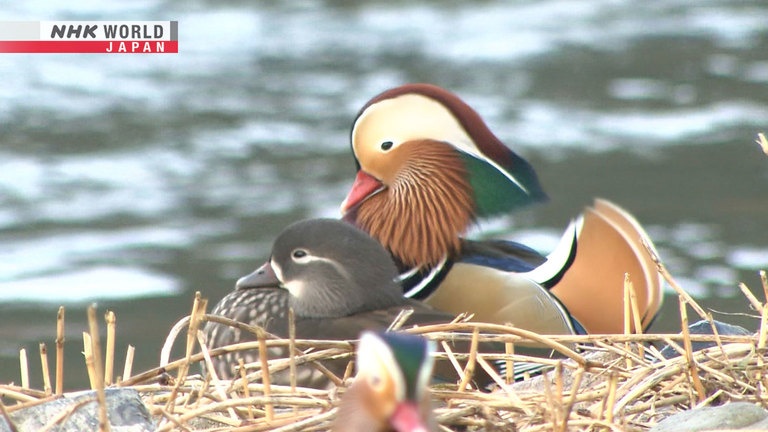Bird
The Japanese language is rich in words and expressions influenced by nature, history and culture. This episode introduces words related to tori, or birds. For ages, the sight of birds soaring in the sky has thrilled people the world over. Guided by poet and literary translator Peter MacMillan, we explore unique Japanese words and expressions inspired by the appearances, habits and sounds of birds.




Transcript
"Yukigesho."
"Karakurenai."
The Japanese language is rich in unique expressions that reflect nature and culture.
Magical Japanese.
Today's theme is "tori," or bird.
For ages, the sight of birds soaring in the sky has thrilled people the world over.
Today we'll explore Japanese words and expressions
inspired by the appearances, habits, and sounds of birds.
Hello, I'm Peter MacMillan.
In Japanese, there is an expression, "kacho fugetsu," which refers to the beauty of nature.
"Ka" means "flower," "cho" means "bird," "fu" means "wind," and "getsu" is "the moon,"
so as you can see, birds are so highly appreciated in Japan
that they have been included in this expression.
Let us begin our exploration of avian words and expressions in the Japanese language
with a familiar feathered friend.
"Suzume no namida."
"Suzume" means sparrow, and "namida" is tear.
This phrase evokes the scant tears from a sparrow's small body
to describe something tiny in amount.
You might hear it used like this:
I hear you got a raise. Congrats!
Thanks. But it's just by "suzume no namida"
- a tiny amount.
Don't be modest. Let's get a drink to celebrate.
Your treat, of course.
"Suzume no namida."
"Suzume no namida."
"Tsuru no hitokoe."
"Tsuru" means "crane," and "hitokoe" is a cry or voice.
"Tsuru no hitokoe" describes a commanding voice that carries above a crowd,
or the final word by someone in authority.
- Man, this meeting has been dragging on. What time is it?
- 8 PM.
Woah. We've been here for five hours.
Let's have the boss make the final call.
Agreed. We need a "tsuru no hitokoe."
- voice of authority.
"Tsuru no hitokoe."
"Tsuru no hitokoe."
You can see from these expressions how highly the crane is regarded compared to other birds.
Cranes and tortoises symbolized longevity in China,
and this idea made its way to Japan.
Indeed, the crane's beautiful and graceful appearance does seem to lend it a degree of elegance
surpassing other birds, don't you think?
"Ugo no shu."
"U" refers to a crow.
"Ugo no shu" translates as "a flock of crows,"
and describes an unruly crowd, particularly a group of soldiers.
It reflects the negative image associated with crows.
"Ugo no shu."
"Ugo no shu."
When you imagine a crow, what comes to mind?
A sinister omen?
A cunning pest?
A nuisance that rummages through rubbish?
Crows tend to carry a lot of negative connotations,
but in Japanese myths, they also appear as messengers of the gods
sent to guide people along a certain way.
Depicted as a three-legged crow,
the "yatagarasu" is revered at shrines as a guiding deity, even to this day.
The crow featured on the uniform of the Japanese national soccer team
is in fact a "yatagarasu," supposedly meant to lead the team to victory.
Let us now turn to some expressions based on the appearance and mannerisms of birds.
"Tobutori o otosu."
"Tobutori" means "a flying bird" and can be used as a compliment on its own.
"Otosu" is to "knock out."
The expression captures the image of someone shooting up into the sky with such force and energy
that they knock out flying birds - in other words,
they're invincible or unstoppable.
I've seen you in a lot of TV dramas and ads lately.
Thanks. I'm actually going to be in a film soon.
You seem to have "tobutori o otosu."
- unstoppable drive.
I'm looking forward to your Oscar win.
"Tobutori o otosu."
"Tobutori o otosu."
But even if you win an award, don't drink too much.
"Chidoriashi."
"Chidori" means "plover."
The expression "plover feet" brings to mind the bird's quirky walk
and describes someone, particularly a drunk person, who is unsteady on their feet.
"Chidoriashi."
"Chidoriashi."
"Oshidori fufu."
"Oshidori" refers to the Mandarin duck, and "fufu" is "a married couple."
As Mandarin ducks are thought to mate for life,
"oshidori fufu" refers to an affectionate married couple, much like the English term "lovebirds."
I made this just for you.
Do you like it?
Mmm.
You're a culinary genius.
They've been married for ages but
are still so cute together.
They're such "oshidori fufu."
- lovebirds.
"Oshidori fufu."
"Oshidori fufu."
There are also many expressions related to birdsong.
"Kankodori ga naku."
"Kankodori" is a cuckoo, also commonly called "kakko" in Japanese
and "naku" means cry.
Both "kankodori" and "kakko" are onomatopoeias of the bird's cry,
which has a lonely ring to it.
"Kankodori ga naku" means "the cuckoo cries"
and is used to describe a deserted establishment with no customers or a slump in business.
"Kankodori ga naku."
"Kankodori ga naku."
This egg came from a chicken, or "niwatori" in Japanese.
"Niwa" means "garden" or "yard,"
and it was quite common in the past for families to keep chickens in their yards,
so much so that the word "tori," which literally means "bird," became synonymous with chickens.
Speaking of roosters, they sound like this.
What onomatopoeia do you use in your language for this sound?
In English, we say, "cock-a-doodle-doo,"
while in Japan, we say:
"Kokekokko."
Let's look at some other onomatopoeia of bird calls.
sparrow.
"Chun chun."
"Chun chun."
nightingale.
"Ho hokekyo."
"Ho hokekyo."
What did they sound like to you?
Woops!
I got so absorbed in our discussion
that I didn't notice it was already morning.
Let's wrap it up for today.
See you next time! Bye!